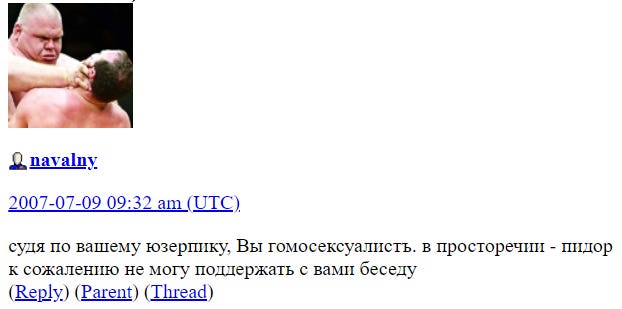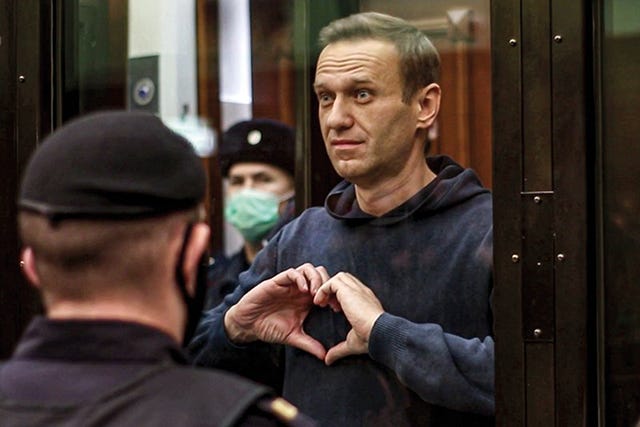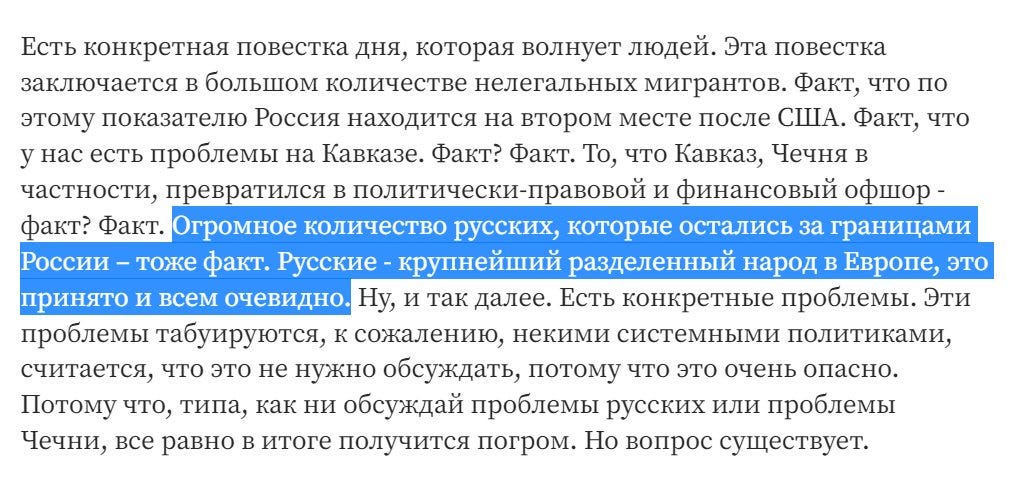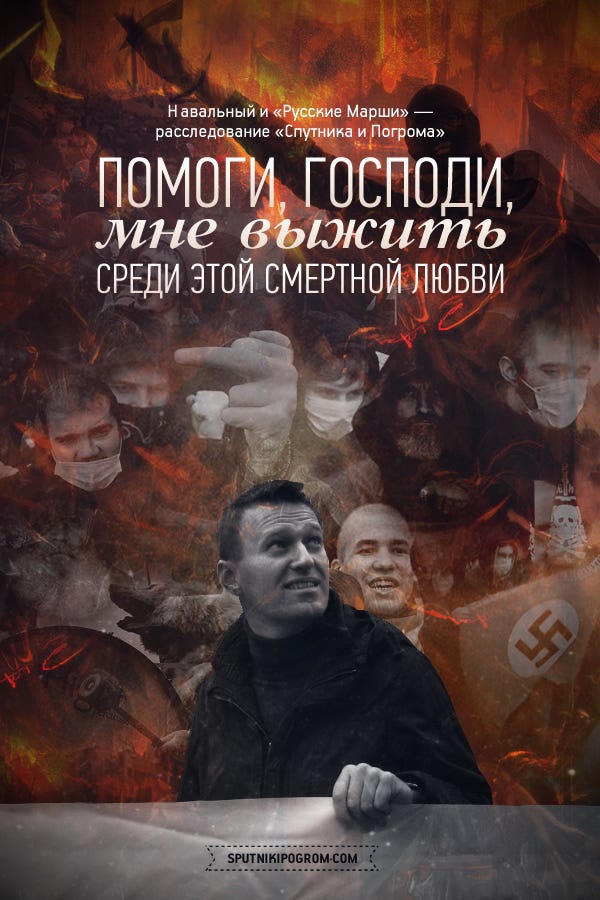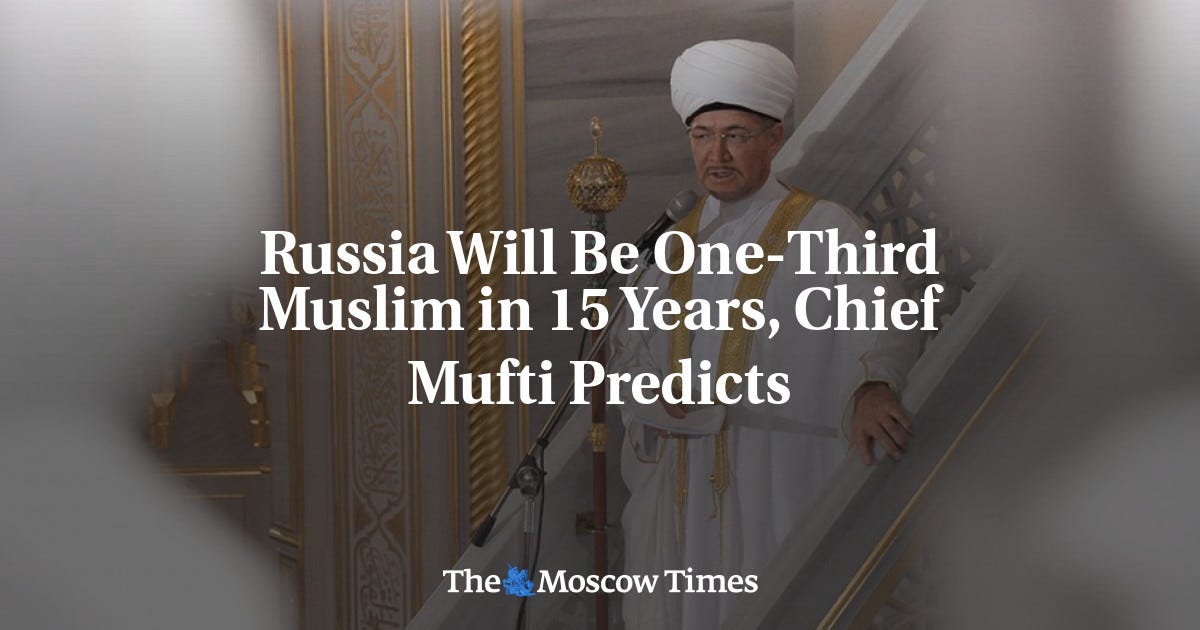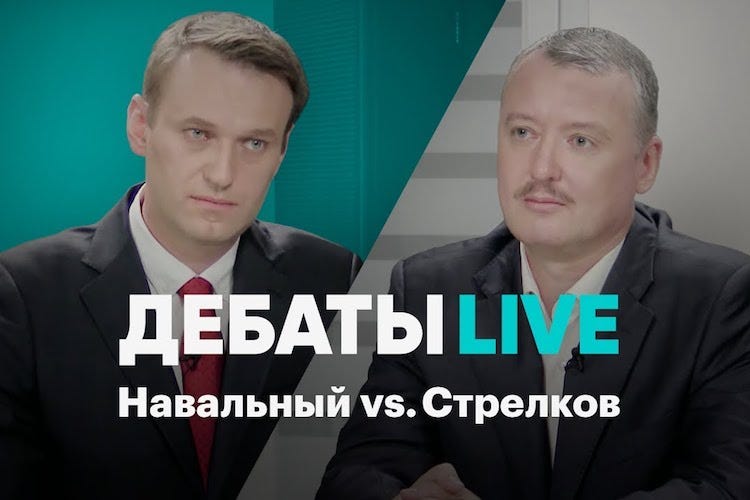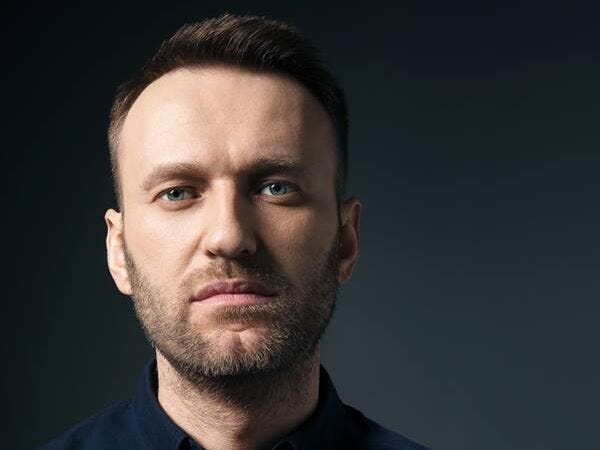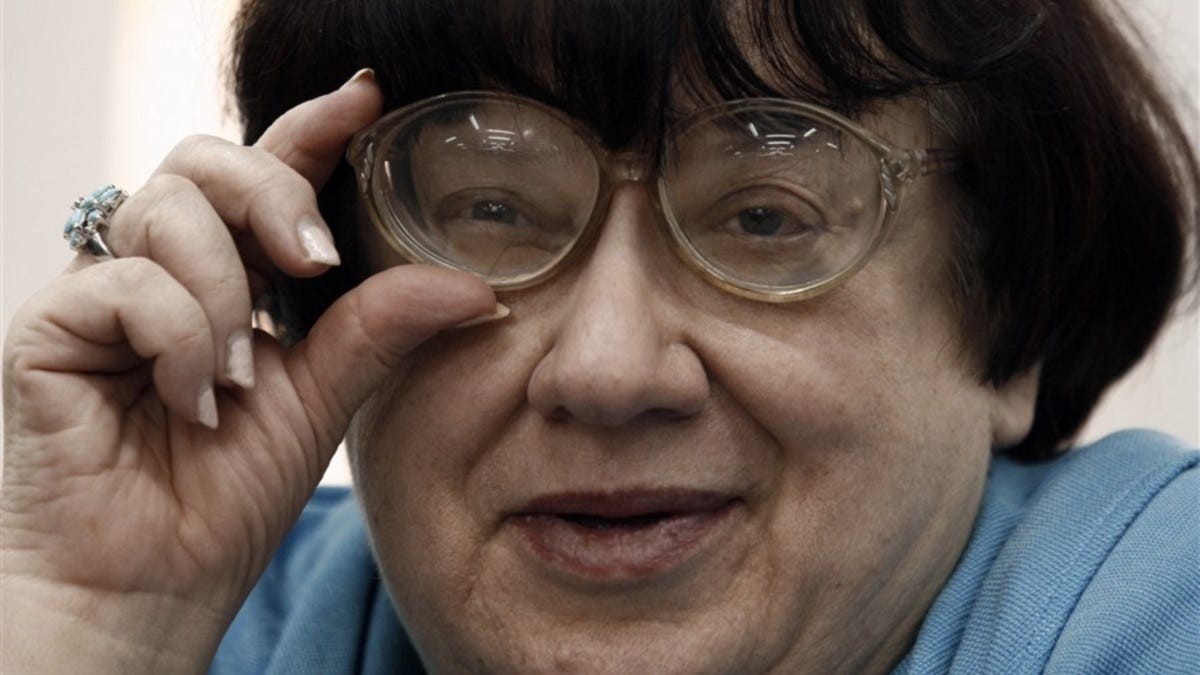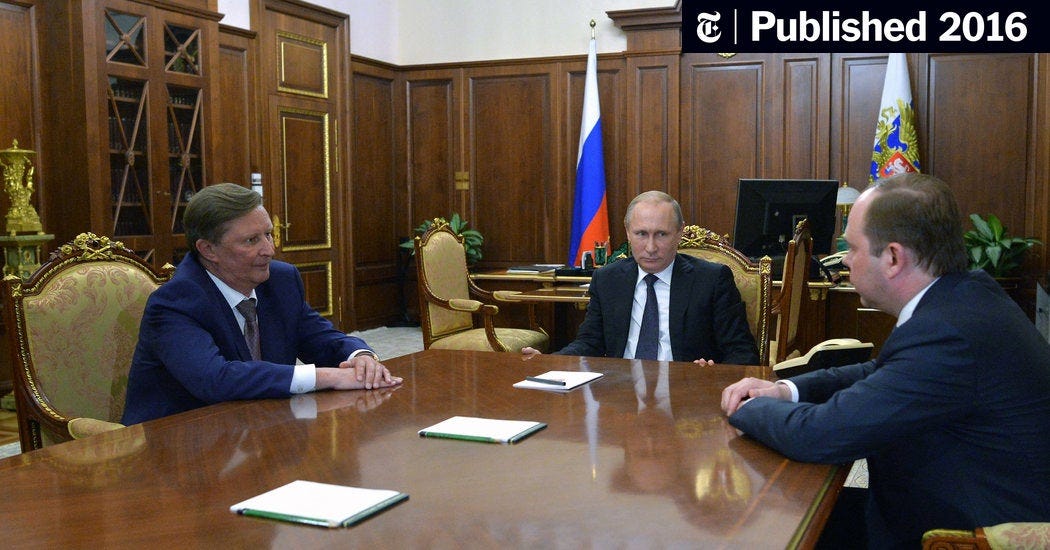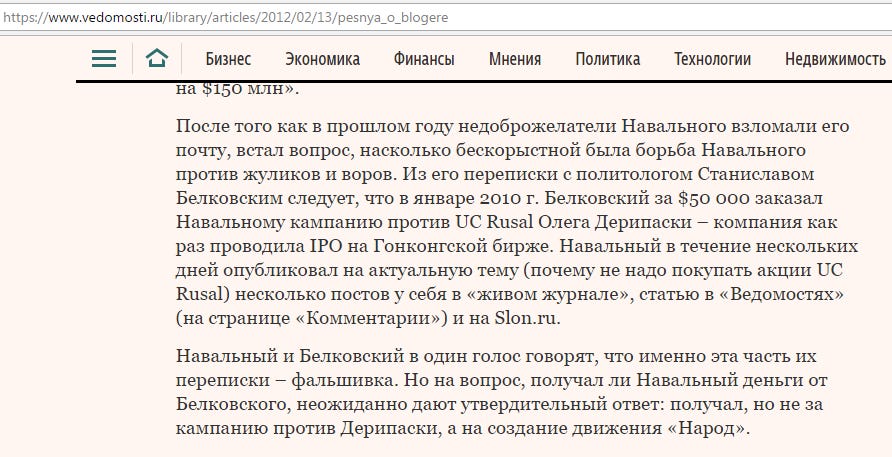Mar 17: Navalvy is anti-Putin, but is he anti-imperialist?
Thread published by Ostap Yarysh on January 27, 2023, thread pubished by Madi Kapparov on September 9, 2022, and my opening comments
Before you begin reading…
I’m not a Russian specialist so I defer to researchers, investigators and academics who have grappled with Russia’s history, present and possible future. From my limited studies and reading I do know that when you are taking on this part of the world, be aware that it’s filled with smoke and mirrors. To make any sense of it, I always focus on and learn about public and non-public figures of Russian society. Navalny is a case in point, and the following threads will make for uncomfortable reading for many people in the West.
In our press, Navalny is considered a hero, and we have a desperate need for heroes. It’s evident that he’s anti-Putin, (he’s not alone) and should not have been poisoned, and be dying in prison for his activities and views.
Ostap Yarysh and Madi Kapparov, however, make the case that Navalny is also driven by a Russocentric imperialist worldview. Is this important? Yes. If you’re looking for someone inside Russia, like Navalny, or in the diaspora, who will swoop in to ‘transform’ Russia into a democratic, law-abiding state, you’re living an illusion. There’s no quick fix.
Why? We may be witnessing the delayed dissolution of the Russian empire, a process that takes generations to accomplish, and a willingness for self-reflection. I’m not seeing this being discussed by Russian figures in the political and diplomatic information space framed in this way. Most of the big league representatives of the Russian diaspora would like to keep the federation as it is with a change of leadership at the top. Don’t mention giving back the 20% of land that the Russians took from Georgia plus reparations, or getting Kadyrov and his mafia men out of Chechnya- they’ll bite your head off.
The few Russians of the diaspora who support decolonisation, and are ready to abandon imperialist designs hold no sway in Russia because they are virtually unknown to the Russian masses, and hold no power to bring about change. They hold court in the West, not in Russia.
It’s a bummer, I know, but it’s also useful to see these ‘heroes’ for who they are, and not what we desire them to be. We’ve made mistakes in the past. We projected our Western values onto Gorbachev and Yeltsin, and yet they were quick to suppress independence movements in the countries that wanted to break away from the Soviet Union first and the Russian Federation afterwards. These acceptable Russian leaders turned out to be just as imperialist abroad as Putin and his cadre.
We chose to see them as ‘democratic’ at home, and closed a blind eye to their imperialist actions abroad for the reasons outlined by Botakoz Kassymbekova in “How Western scholars overlooked Russian imperialism,” and “The Road to Democracy in Russia Runs Through Chechnya”. Edward Lucas and Dr Kristina Sabaliauskaitė also provide analysis on this topic at the recent event, "Pushing Pushkin: the imperialism and decolonisation of Russian culture," at the European Parliament.


By seeing Navalny realistically (I won’t touch on Volkov in this post), we can focus on what is actionable at this very moment: ramp up our efforts to assure Ukraine’s victory. Stop with all the useless chatter. The Ukrainians are capable of defending their nation, and they’ve managed to start cleaning up house by getting rid of corrupt and treacherous institutional figures (I only wish we’d do the same) while they’re defending their nation. These acts tell us they are serious about joining NATO and the European Union.
In the reading that follows, I invite you to begin with Ostap Yarysh’s brief thread as an introduction, and then move onto Madi Kapparov’s long thread for more substance.


Madi Kapparov thread: Navalny is a “liberal opposition” figure?


So why do I and so many others from the neighboring countries and non-ethnic russians from russia dislike navalny so much? Well, there are a lot of good reasons. Let's look into the man's past.
But first, a few clarifications. Is navalny a russian opposition leader? The optics of his position suggest so. To the unenlightened, he and his Anti-Corruption Foundation, FBK, seem to be a very potent threat to the current Kremlin regime promising a better future for the ethnic russians that is. Ethnic minorities within russia and the neighboring countries on the other hand would not be so lucky, should he ever be seated on the throne in the kremlin.
Why? Let's start from the beginning.
Navalny started his political career with the social-liberal party Yabloko. In the 1990s it was an opposition party to yeltsin. However, even they did not outright oppose russia's colonial war against Ichkeria, calling the war "ambiguous and complicated."
In 2006 navalny was expelled from Yabloko for his participation in the ethnic russian marches (русский марш). Those are annual events in russia and attract thousands of ethnonationalists in country-wide demonstrations chanting "russia for ethnic russians!"
The Der Spiegel article is from 2007. Read it, it explains very well what those marches are. Technically the first ever ethnic russian march took place in 2005. So navalny liked the idea from the very start.
The Russian March: Investigating the Symbolic Dimension of Political Performance in Modern Russia- DENIS ZUEV
To keep things chronological, let's look at what else happened in 2007. At a political debate Navanly got into a violent argument with one of the attendees. The details of the incident are conflicting. It is clear the two got into a fight. expert.ru/russian_report…
"United Russia" refused to debate with competitors on television. In the evening of the same day, there was a fight and shooting from a traumatic pistol, which crowned a political dispute in the Moscow club Gogol. The brawl was witnessed by the correspondent of "RR"
Later it was alleged that the attendee was an FSB agent. During the fight, navalny fired several shots from a gas pistol that he brought to the debate. Navalny threw in a few ethnic slurs at his opponent, who is Ossetian. Navalny was arrested but shortly released without charges.
Navalny is no stranger to using derogatory language. Below is his response to someone in the comments to his post: "judging by your profile pic, you are a homosexual, or colloquially - a f** unfortunately I cannot continue the conversation with you."
In 2007 navalny also released a xenophobic clip. He titles himself a "certified nationalist" and says "I recommend full sanitization. Everything in our way should be carefully but decisively removed through deportation." He equates immigrants to cavities.
On August 1, 2008, russia invaded Georgia on a fabricated casus belli of genocide perpetrated by the Georgians against the local minorities, American biolabs (imagine that), etc. Other details on the invasion:
Navalny shared his thoughts on the invasion of Georgia as it was unfolding. Navalny called the Georgians "rodents," an ethnic slur in russian, and argued for a more destructive war against Georgia arguing that the entire country had to be taken over.
After the active phase of the war against Georgia was over, Navalny did delete his Facebook post and expressed "regret" for calling the Georgians "rodents." However, he never retracted and, worse, maintained his imperialist stance for a russian takeover of Georgia.
He also never deleted his Georgia blogpost from Livejournal (Zhivoy Zhurnal). On August 12, 2008, he posted this: navalny.livejournal.com/277835.html You may need a VPN connection to view it. Many things he wrote in the post highlight his outright russian ethnonationalism and imperialism.
The blogpost is sarcastically titled "Give Georgia a chance." Here Navalny says: "If a small nation likes to play big politics - it must become a satellite of a large nation. Or it must become an enemy of a large nation."
Here Navalny calls Georgia's then-president Saakashvili a "Europeanized Georgian Hitler."
Finally, Navalny ends his post with the following three sentences: "Let's love Georgia and give it a chance! Ha, it would be great to recognize Transnistria as well. The Moldovans deserve a chance too." The post is full of schadenfreude oozing with imagined imperial greatness.
Alright, back to Navalny's participation in the ethnic russian marches. Till 2013 he attended each march held annually. Starting in 2011 he was a member of the committee organizing the ethnic russian marches. snob.ru/selected/entry…
Alexei Navalny joined the organizing committee of the Russian March
Navalny calls liberals to the "Russian March". His supporters are upset: they are distracted from criticism of another public procurement and forced to think about the problem of nationalism
The same year the moscow part of the marches was attended by up to 25 thousand people. The common slogans used at the ethnonationalist demonstration were: "Give russia back to the ethnic russians!" "russia is an ethnic russian land!" etc. Again, Navalny was one of the organizers.
There is also plenty of video evidence of Navalny's attendance of the ethnic russian marches. Here is a Youtube video compiled from multiple sources along with some translated things Navalny's said at the marches.
In 2011 lenta interviewed navalny for anarticle titled "An oppressed ethnic russia. Why Aleksei Navalny does not want to feed the Caucasus." Navalny defends his active participation in the ethnic russian marches. However, two other things stand out for me.
First, Navalny's thinly veiled disgust with the Caucasus is just beneath the facade of his financial reasoning. His rhetoric lines up with the common colonial treatment of the territories. The Northern Caucasus are called an "internal abroad" in russia.
The North Caucasus: Russia’s Internal Abroad?
Alexey Malashenko, Carnegie Endowment for International Peace
Second, explaining his participation in the marches Navalny says: "A large number of ethnic russians who remained beyond russia's borders is also a fact. Ethnic russians are the largest split people in Europe, this is accepted by and obvious to everyone"
Do you see any parallels?
The response by Navalny reminds me of putin's speech in 2005: "For the russian people, [the collapse] became a real drama. Tens of millions of our citizens and countrymen found themselves outside Russian territory." putin likes using "split people" too.
Navalny rose to prominence in 2013. That year he decided to stop attending the ethnic russian marches and "go mainstream." He ran against sobyanin in the moscow mayoral elections. Navalny was allowed to run despite the concurrent kirovoles case against him.
The russian far-right was not pleased with Navalny's non-attendance of the marches in 2013. sputnik and pogrom, a russian far-right outlet, published their analysis of Navalny's potential reasons behind his decision to stop attending the marches. sputnikipogrom.com/politics/6055/…
The first reason according to them is the "radicalization of the marches" that pushed Navalny away. Let me be clear here: the ethnic russian marches were radical starting from their inaugural event in 2005. Again, scroll up and read the Der Spiegel piece from 2007 if you haven't.
The second reason according to sputnik and pogrom is hypothetical by their own admission: on the one hand, Navalny could be a fake nationalist; on the other hand, he is a "technologist, who understands that contemporary russia without nationalism will get nowhere."
Hence, Navalny tamed his rhetoric to make his nationalism appeal to wider audiences. I am more inclined to believe the latter reasoning, wider audiences had to be won over not only domestically but also abroad if he is ever to have a chance for the kremlin crown.
(Monique: our current Prime Minister, Giorgia Meloni, did the same.)
However, make no mistake, Navalny never retracted his far-right outbursts, nor has he ever apologized for them.
rferl.org/a/navalny-fail…
In fact, Navalny continued to exhibit his xenophobic ethnonationalist nature. In 2015 he published posts decrying russia's immigration policies allowing "Islamists" into the country. He does not hide his disgust with mosques being allowed in russia.
Where is the "orgy of tolerance" taking place?
Now it is very appropriate to remind everyone that Europe is forced to accept Muslim migrants - they are bursting in thousands across sea and land borders and it is impossible to stop them except by executions.
Fun fact: Muslims are native to the Northern Caucuses and Middle and South Povolzhye in russia. That's 14% of russia's population.
Alright, let's shift back to navanly's stance on Ukraine.
Not only he was against sending weapons to Ukraine in 2015 as I mentioned earlier, but he also shares the kremlin's imperialist views on Crimea: Crimea is russia according to Navalny.
Worse yet, in 2017 navalny had a "debate" with strelkov-girkin a war criminal, one of the key commanders of the russian invasion of Ukraine in 2014, and one of the men responsible for the MH17 shootdown. Navalny was unimpressive in the "debate." Details:
I will not discuss in detail navalny's FBK or his team's youtube channels (popular politics, navalny live). However, I'll make a few subjective observations.
First, they do say that the war is illegal. However, they keep chirping about the russian army's pervasive corruption.
As far as I am concerned it is wonderful that the russian army is so corrupt. Navalny's team does not share my views. I also cannot recall them mentioning the genocide of Ukrainians being perpetrated by russia. I could be wrong. Do let me know.
However, credit where credit is due: in April 2022, Navalny called the West to open an "information front" against the current kremlin regime. "One Javelin shot costs $230K. For such money, we could get 200M views," navalny said.
I tried to dig into FBK's financial backing. Their current financing is broken down largely into two categories: donations and ad revenue. According to FBK's Volkov 30K people donate to the foundation on a regular basis and 200K on a one-off, the average donation size is 500RUB.
Overall FBK's financing is not transparent. There are multiple RT articles on FBK's financing. I refuse to cite them, but I thought that you should know. If you are interested, go look for them; they are easy to find (they are in russian).
Alright, let's move on to what other russians politicians had to say about Navalny.
First, I found Nemtsov's phone call intercepts. If you do not know who Nemtsov was, here is a brief overview of his political career:
In the intercepts, Nemtsov calls navalny "a specialist in online crowd manipulation." Moreover, it seems that at the behest of navalny multiple journalists were running a defamation campaign against Nemtsov.
I was unable to verify the authenticity of the intercepts, but it does sound like Nemtsov's voice.
Second, Yavlinsky published a long opinion piece on his personal website. Yavlinsky was a prominent opposition figure in the 1990s and early 2000s. However, he is now largely retired. Here is a brief overview of his political career:
GRIGORY YAVLINSKY | Grigory Yavlinsky
Chairman of the Federal Political Committee of the Russian United..
In his February 2, 2021 article Yavlinsky wrote the following about navalny: "As a whistleblower blogger, a “revizorro” of the upper echelons of russian government and business, navalny served as an indicator that made it possible to judge...
Without Putinism and populism- Yavlinsky.ru
"...the behind-the-scenes struggle within the elites by the nature of broadcasted information. But since almost everyone in russia is convinced of the existence of gigantic corruption, navalny's revelations were received positively, and the economic recession and impoverishment of the population in the past ten years made it possible to successfully play on a widening gap in the level of wealth, turning into an abyss (“Peace to the huts, war to the palaces!"). Moreover, political populism, degenerating into nationalism, as a result, often leading to violent clashes, is a dangerous global trend nowadays. russia is no exception here. Navalny's investigations, unfortunately, did not and cannot have practical results for society. All exposed remain in their places and with their money."
Yavlinsky also cites Novodvorskaya. Here is a brief look into her career and why her opinion matters: Novodvorskaya on navalny in 2011: "Navalny may become the future leader of crazed crowds with a Nazi inclination...
"...The fight against corruption can lead to what it has already led to in Belarus. Lukashenka seduced the people by talking from morning to evening about the fight against corruption. And he easily bought gullible Belarusians. And the unthinking intelligentsia supported him, deciding that they could manipulate him as they pleased. Well, we see the Belarusian [political] landscape today… Arrests are not a political indulgence. The bolsheviks also did hard labor, and dzerzhinsky spent 10 years in prison. hitler was also imprisoned. It is a pity that not for 15 years. Maybe there would be no World War II... If the crowds follow navalny, fascism awaits the country in the future... The wave that is now rising is rising not only against putin. It rises for an undemocratic future for russia. It rises for past communism or for future fascism. And navalny is one of the potential leaders of this new death.”
So Novodvorskaya warned us of navalny's fascist nature back in 2011. Yavlinsky seems to agree in 2021. However, Yavlinsky also alluded to something interesting.
"navalny served as an indicator that made it possible to judge the behind-the-scenes struggle within the elites by the nature of broadcasted information," Yavlinsky writes. This sentence is loaded and indicates two things.
First, russia's ruling elites are not a unified monolithic block that they present to the world. There are power struggles within their circles and we only get to see glimpses of them. The most notable example is probably sergei ivanov.
ivanov was once an influential and popular man in russia. During the Second Chechen War, he was russia's minister of defense. russia's successes in that war added to his clout. In 2007 he was appointed first deputy prime minister starting rumors that he was to replace putin.
However, ivanov is himself from the FSB circles - he was putin's deputy while putin headed the FSB. It seems that ivanov leveraged his new first deputy prime minister position too quickly, creating his own circle. putin took note, as he intended to do a switcharoo and come back as russia's president in four years. The switcharoo was required as russia's constitution at the time did not permit more than two consecutive terms as president. ivanov showed himself as someone who would not surrender the presidential position without a fight.
So putin chose someone with little to no political capital for his switcharoo scheme -- medvedev.
In 2016 ivanov was dismissed as putin's chief of staff and appointed as a special representative...on the issues of environment, etc. A significant demotion.
Second, Yavlinsky's statement suggests that navalny is either used or employed by russia's elites for their internal struggles. He does not say it directly as such a claim would be a serious accusation requiring substantive evidence.
However, we are not in the court of law. Do we have any evidence suggesting that navalny is used by the kremlin elites? We do, but it is not conclusive.
First, you already saw the Nemtsov phone call intercepts. Again veracity is unconfirmed, but it seems that navalny ran a defamation campaign against Nemtsov, a prominent kremlin critic who always provided documented support to his claims.
Second, in 2010 navalny was allegedly paid $50,000 to run a defamation campaign against UC Rusal ahead of their IPO. The company belongs to deripaska, a russian oligarch and putin's ally. The article below shows navalny's hacked emails as evidence.
Navalny “to order”: $50,000 for articles about Rusal
During an interview on the Dozhd TV channel, Ksenia Sobchak reminded Alexei Navalny of a series of commissioned articles in January 2010 that Navalny wrote for $50,000.
Third, navalny joined aeroflot's board of directors. The article below indicates that navalny's candidacy was offered and approved by alexander lebedev, a russian oligarch and former KGB and SVR officer. He also happens to be s. ivanov's close associate.
Navalny joined the board of directors of Aeroflot
Blogger Alexei Navalny joined the board of directors of Aeroflot in accordance with the decision of the annual meeting of shareholders, RIA Novosti reports . Navalny was nominated to the board of directors by Alexander Lebedev's National Reserve Bank , which owns about 15 percent of the air carrier's shares.
There are other pieces that I found that seem to be a bit of a stretch. But to conclude, all I can say is that navalny is an ethnonationalist with troubling extreme far-right inclinations. He also has a shady past. And finally, he is most definitely not a sausage sandwich.








